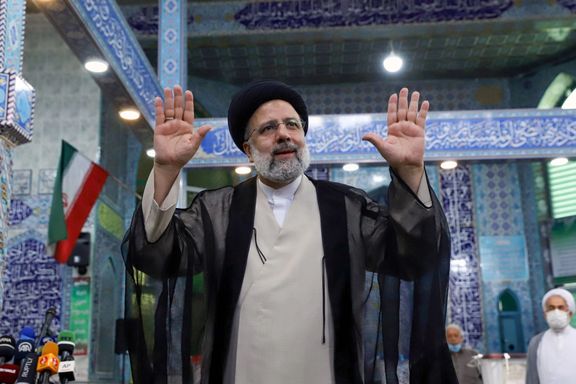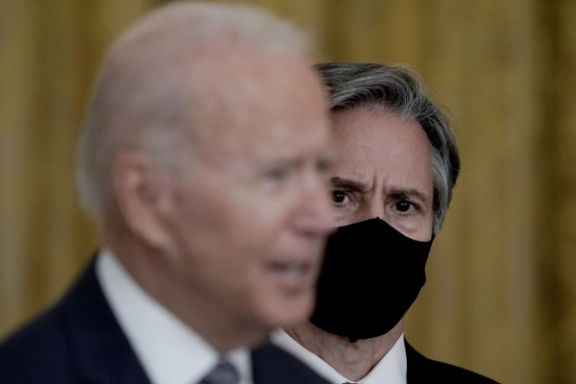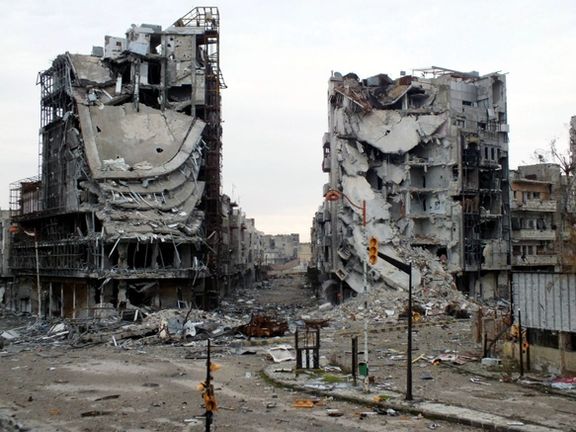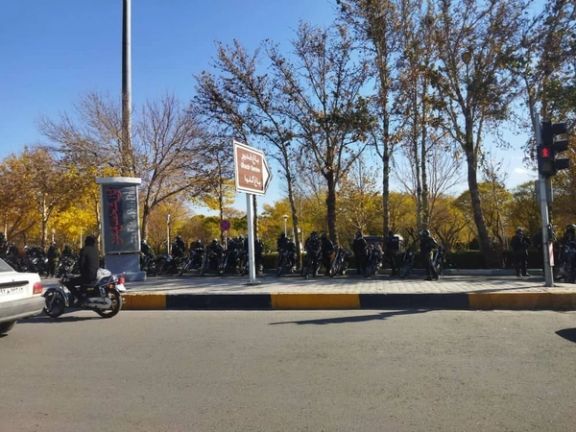Iran's President To Address Nation Sunday, After Failed Nuclear Talks

Iran’s President Ebrahim Raisi will make a televised address to the nation on Sunday, state media reported, a day after nuclear talks in Vienna adjourned amid pessimism.

Iran’s President Ebrahim Raisi will make a televised address to the nation on Sunday, state media reported, a day after nuclear talks in Vienna adjourned amid pessimism.
Raisi who was elected in June and took office in early August delivered two television speeches before his 100 days in office were completed. Critics evaluated his first 100 days negatively, saying he did not manage to address any of the pressing issues facing Iran.
State media in recent days has begun defending Raisi’s first hundred days, specially a speedy Covid-19 vaccination campaign. But the nuclear issue and United States sanctions are the crucial issues impacting the lives of ordinary people.
A high inflation rate of 50 percent, a falling national currency and no positive outlook in the foreseeable future are the most salient issues for hard-pressed working Iranians. A lifting of US sanctions can help alleviate pressure but Raisi’s negotiators sent to Vienna have presented tough demands that United States and its allies are not likely to accept.

The United States 'quietly' renewed a waiver for Iraq to buy Iranian electricity just as Iran’s nuclear talks in Vienna resumed, a conservative website has said.
TheWashinton Beaconreported Friday that it had obtained a ‘non-notification’ provided to Congress signed November 19 that gave Iraq another 120 days to buy electricity from Iran without facing the threat of punitive US action.
The Free Beacon said the waiver was transmitted to Congress ten days later, on the day nuclear negotiations between Iran and world powers resumed in Vienna in an attempt to revive the 2015 deal, the JCPOA (Joint Comprehensive Plan of Action).
‘Goodwill concessions’
Hence the timing had prompted accusations, the Free Beacon continued, that the Biden administration was "offering concessions to Tehran to generate goodwill" as the JCPOA talks resumed.
Richard Goldberg, the former ‘director for countering Iranian weapons of mass destruction’ in Trump's White House National Security Council described Iraq’s electricity waiver as a "dressed-up Chanukah present to" Iran. Chanukah is a Jewish festival.
The Free Beacon was concerned that the Biden administration was responding to calls from Iran for the US to show ‘good will’ over the nuclear talks. “Good deal within reach if the West shows good will," Iranian Foreign Minister Hossein Amir-Abdollahian tweeted Friday.
But the renewal of the Iraq’s waivers by both the Trump and Biden administrations has been largely a routine matter in the past.
The Free Beacon did reports that the State Department had justified the waiver, granted "at the secretary [of state's] discretion" (under executive orders passed by Trump), remained "in the national security interest of the United States" and was necessitated by Iraq's failure to reduce reliance on Iranian electricity.
Electricity Shortages
Iraq leans heavily on Iranian electricity and gas. As highlighted by human rights groups, Iraqi hospitals and other public services have in recent years faced electricity shortagesas the health system struggles to recover from years of sanctions and war.
The US sanctions waiver for Iraq to receive electricity and gas exports from Iran has been renewed several times since 2018 when former President Donald Trump withdrew from the 2015 Iran nuclear deal with world powers, Joint Comprehensive Plan of Action (JCPOA), and took powers to sanction any third party dealing with Iran.
The Trump administration renewed Iraq’s waiver for 90 days on January 4 before handing the administration over to President Joe Biden. The Biden administration renewed the waiver for 120 days on March 31, ahead of the first round of nuclear talks with the administration of President Hassan Rouhani, and for another 120 days in early August before President Ebrahim Raisi took office.
Iran owed $6bn
Iraq owes over $6 billion to Iran for electricity and gas imports, which has been frozen by Iraqi banks wary of possible US punitive action. Tehran has struggled to access the payments despite both Iranian and Iraqi officials saying they are working for a mechanism to pay the debt.
Repeated suggestions that, with dollar payments blocked, Iran might receive payments in kind, either though using dinars or barter, appear not to have borne fruit.
Citing a "reliable source" in March, an official of the Iran-Iraq Chamber of Commerce, Hamid Hosseini, said Iran had received some payments from funds frozen in Iraq, including the state-owned Trade Bank of Iraq, after Washington’s agreement. Hosseini said the Iraqi government had a variety of explanations, including US sanctions, not to pay Iran for natural gas.
In June the Central Bank of Iran governor Abdolnaser Hemmati said the bank had made progress in talks with Iraqi officials over using frozen Iranian resources to buy humanitarian goods, but Iraqi officials have not confirmed such claims.

One day after the inconclusive end of nuclear talks in Vienna Iran’s currency rial fell against the US dollar to the psychologically important level of 300,000.
Iranian authorities in recent days devised ways to show that the national currency was actually rising against major currencies as its diplomats met representatives of major powers to discuss a possible revival of the 2015 nuclear deal, the JCPOA. However, talks adjourned on Friday with no results except pessimism among European negotiators and disappointment on the part of the United States.
"Iran right now does not seem to be serious about doing what's necessary to return to compliance, which is why we ended this round of talks in Vienna," US Secretary of State Antony Blinken told the Reuters Next Conference on Friday.
The Iranian currency has fallen more than ninefold since early 2018, when it became apparent that then-president Donald Trump was inclined to leave the JCPOA and impose sanctions on Iran. He did so in May of that year and the rial has kept falling ever since.
US sanctions on oil exports and international banking has deprived Tehran of its main foreign currency revenues that financed half its government budget. The solution for officials was to print money, short of negotiations and a new agreement with Washington. Liquidity more than quadrupled in the past three years, pushing inflation rate to 50 percent and the rial down to Saturday’s level against the dollar and other major currencies.
A week ago, Iran tried to protect its currency by limiting legal purchases by small buyers. According to the law, every Iranian citizen can get $2,000 a year with a slightly favorable dollar rate for travel abroad and other needs such as medical care or wire transfers for students abroad.
Some people sold this right to others who needed more dollars, by using their national ID card to buy the currency. The government clamed down on the practice by tightening the requirements, demanding firm evidence of impending travel, such as the original copy of an air ticket. Buyers flocked to street dealers, instead of official bank exchange offices and the dollar rose to more than 300,000 rials.
Only once before the rial has lost so much value and that was before US presidential election last year, when people were nervous that Trump would be reelected and would increase pressure on the Islamic Republic. Once Joe Biden got elected, the pressure on rial declined somewhat, as he has already announced his intention to revive the JCPOA.
State-controlled media has begun blaming conspirators for the fall of the rial, as they have done on previous occasions, but the reason for having a battered currency and an economic crisis is obvious to most Iranians.
Noor News, a website close to the national security council said Friday that the fall of the rial “is a fully planned” conspiracy and blamed neighboring countries, in a clear reference to the United Arab Emirates and Saudi Arabia, who see Iran’s nuclear program and regional expansion as a serious threat to their security.
The government’s official IRNA news website blamed “greedy traders” and enemies who spread “fake news” about the lack of prospects for the success of nuclear talks.

Despite a decade of fighting to save the Syrian government, Iran has a small share of Syria’s trade, and might lose out to financially stronger players .
The Revolutionary Guard, which usually tries to justify the high cost of involvement in the Syrian war, has been arguing that trade and investment in Syria will pay off and compensate billions of dollars Tehran has spent to support Bashar al-Assad.
Tasnim news affiliated with IRGC quoted Syria's economy and trade minister on Friday as saying that Syria's new investment law is very favorable to Iranian investors.
What Mohammad Samer al-Khalil said was that the law would offer benefits, tax exemption, and guarantees to all investors, including Iranian companies. Al-Khalil expressed hope for greater bilateral economic cooperation and trade.
The extent of Iranian military expenditures and financial aid to Syria to keep President Bashar al-Assad in power is not known. In May 2020 a member of the Iranian parliament's National Security and Foreign Policy Committee, Heshmatollah Falahatpisheh, made an unprecedented declaration that Iran has spent $30 billion in Syria and must recoup the loss.
Iran has also spent blood on top of treasure to defend Assad's government. No one knows how many servicemen have been killed in Syria, but Iran at one point was deploying 20-30 thousand fighters, mostly Afghan and other mercenaries and allies, but also some of its own troops.
A program on Iranian national television Thursday highlighted obstacles to increasing trade. Keyvan Kashefi, chairman of the Iran-Syria chamber of commerce, highlighted the difficulties caused to both countries by US sanctions as well as the absence of safe land and maritime trade routes.
The director of the Trade Promotion Organization of Iran, Alireza Peymanpak, told the program that Iran's Trade Development Fund had allocated $50 million to supportIranian companies' exports to Syria.
The deputy chairman of Iran's Chamber of Commerce, Mohammad Amirzadeh, in November blamed the government for what he said was a low level of Iran’s exports to Syria, which make up 3 percent of Syria’s imports compared to 30 percent from Turkey. Some Iranian trade officials recently said Syria had completely stopped importing Iranian vehicles, which had been a major export item.
The odd thing is that Turkey has been supporting Assad’s Sunni opponents in Syria for years and is the protector of Idlib province where all the Sunni factions, defeated in the war, have found a relatively safe haven.
In early November, reports said that Syria had expelled top IRGC commander, General Seyyed Javad Ghaffar, a move that was seen as Assad’s attempt to improve ties with rich Sunni Arab states.
While Tehran has been portraying the development as an ordinary event, The Times of Israel on November 11 quoted Saudi sources as saying that Ghaffari was expelled from Syria as he was "accused of ‘major breach of Syrian sovereignty’ after attacking US forces, and deploying Iranian weapons to unapproved places."
However, Tasnim acknowledged in an earlier report that according to "foreign news sources," Ghaffari was forced by the Syrian government to leave Syria after a visit to Damascus by the Foreign Minister of the United Arab Emirates, Sheikh Abdullah bin Zayed Al Nahyan's on November 9.
Iranian state media have occasionally reflected dissatisfaction in recent years that Iran’s share of the Syrian economy is small and Russia, which intervened in the war decisively to save Assad, has more influence and more chance of benefitting from Syria’s reconstruction than Iran.
In the aftermath of a war where reconstruction costs are put at $250-$400 billion, Syria badly needs to boost economic relations with regional countries. While Arab League countries are gradually resuming diplomatic relations, Syria faces United States and European Union sanctions.
Iran, itself under US sanctions and coping with a serious economic crisis does not have the financial resources to help Syria’s reconstruction.

Iran’s budget planning chief has said that the country will not tie the future of its economy to nuclear talks and will aim for 8 percent growth next year.
Iranian media had reported earlier that budget planners believe Iran can achieve the unprecedented rate of 8 percent economic growth, despite United States sanctions, which have crippled the economy since 2018.
Massoud Mirkazemi, the head of the Planning and Budget Organization, in tweets on Friday confirmed the news, while some economists told media in Iran they have serious doubt about achieving any growth under US sanctions.
Iran’s economic growth has been zero for the past 15 years, as international and US sanctions interrupted its oil exports and global banking relations. Although there were years when there was a positive rate of growth, overall the economy has stalled.
Mirkazemi claimed that non-oil exports increased by 40 percent since the beginning of the Iranian year in March.
Iran’s steel production fell by 15 percent in October, following smaller declines earlier in the year resulting from lack of electricity.
Iran’s method for generating revenues has been a relentless increase in liquidity, which has led to a 50-percent inflation rate and a ninefold drop in the value of the currency.

Authorities blocked access Friday to the dry riverbed in Esfahan, where those who protested the previous Friday planned to congregate at noon for prayers.
According to postings on social media, police and security forces including Basij militia deployed around the city's landmark Khajoo Bridge, the center of last Friday's protests, and in nearby areas.
Security forces also set up checkpoints in the city. Two videos acquired by Iran International show a roadblock, and dozens of riot police and other security forces maneuvering on motorcycles.
The large-scale police operation on Friday amounted to an undeclared martial law in the city.
The few people managing to tweet from Esfahan Friday said mobile internet was disrupted and that wi-fi connections were too slow for their photos and videos. Some also reported disruption to mobile phone connections.
Mohammad-Reza Mohammadi, chief of Esfahan traffic police, announced Thursday that roads along the river and leading to the bridge would be closed to cars, motorcycles and pedestrians from 5am Friday, and parked vehicles would be clamped and removed.
An anonymous call was widely circulated on social media in recent days called for people to gather for Friday prayers in the dry bed of Zayandeh Roud. Germany-based journalist Mehdi Mahdavi-Azad told Iran International this was a “very clever move” to draw people away from the usual Friday prayers led by “state-appointed imams.”
While security forces prevented people from reaching the river bed, Mojtaba Mirdamadi, the Friday prayer imam of Esfahan, said previous administrations had ignored the plight of farmers facing water shortages and that the issue lay now “in God's hands." Mirdamadi in previous times criticized the government of former president Hassan Rouhani for alleged mismanagement of water resources.
"We hope rain sent by God will solve all the problems," Mirdamadi told his congregation and advised them to hold special prayers for rainfall.
In Mashhad in north-eastern Iran, Friday prayer leader Ahmad Alamolhoda told those congregated that that among last week's protesters had been "mercenaries of the enemy" who had used Molotov cocktails. He said the people of Esfahan would not “oppose the Revolution for the sake of food and water.”
Authorities and state media in the past few days called the call for Friday’s rally politically motivated and suggested "rioters" were trying to take advantage of water protests.
Esfahan’s governor, Mohammad-Ali Ahmadi, said in a radio program Thursday that no one had applied for a permit to protest. He argued that that the authorities had heard farmers' voices and that farmers had realized "anti-revolutionary groups" were looking to manipulate any protests. "Security forces will prosecute those who spread rumors and fake news on social media," he warned.
The Islamic Republic routinely ignores applications requesting permit for political gatherings and only issues permission for rallies organized by the government. When a group congregates for a protest, they are usually dispersed or arrested.
Esfahan farmers' union in a statement Wednesday said it was not planning further protests Friday. Many on social media have alleged they had been coerced by security forces.
The justice department of Esfahan province said that in a statement Thursday that farmers no longer intended to protest, so that protests on Friday would be unjustified, illegal, and aimed at "abetting and aiding the enemies of the Islamic Republic.”